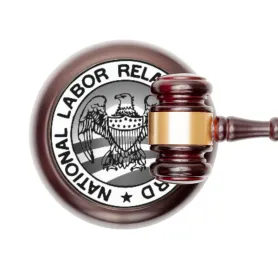In AT&T Mobility LLC , 370 NLRB No. 121 (2021), the NLRB majority (Members Ring and Emanuel) held that the Employer could lawfully maintain a workplace policy prohibiting its workers from recording conversations with their co-workers, managers or third-parties, even though its application in one particular circumstance was found unlawful. Notwithstanding the fact that the rule had been applied unlawfully, the Board majority concluded that the policy itself was lawful under Boeing Co., 365 NLRB No. 154 (2017), and overruled in part its decision in Lutheran Heritage Village Livonia, 343 NLRB 646 (2004), finding that an instance of unlawful application of a facially neutral rule does not automatically warrant a finding that the rule can no longer be lawfully maintained.
Importantly, however, Chairman McFerran disagreed in her dissent, foreshadowing how a newly-constituted Board may decide the case differently and/or abandon the Boeing framework.
Background
An employee at a retail location, who was also a union shop steward, recorded a termination meeting between the Company’s representatives and a fellow bargaining unit-member, who had requested the employee’s presence at the meeting. Upon learning that the shop steward recorded the meeting, his manager made him delete the recording on his work phone and threatened him with some unspecified adverse action.
The Board’s Holding
Applying the Boeing framework, and the cases discussed in Boeing and since, the majority reiterated that an Employer’s no-recording policy constitutes a lawful “Category 1(b)” rule, meaning that the “potential adverse impact on protected rights” was “outweighed” by the employer’s business justification. As a result, such types of rules are always lawful under Boeing.
However, the Board also found that Employer unlawfully applied the policy when it threatened the employee, who was engaged in protected activity at the time the recording was made, for violating the policy. The Board then consulted its decision in Lutheran Heritage, 343 NLRB 646 (2004), wherein the Board applied a three-part framework for determining whether an employer violates Section 8(a)(1) of the Act by maintaining a neutral work rule if employees reasonably construe the rule to prohibit protected activity. The Board held that a policy could be rendered unlawful, and subject to being rescinded as part of a remedy if the policy had been “applied to restrict the exercise of Section 7 rights.” Instead of following Lutheran Heritage and ordering the Company to rescind the policy, the Board overruled Lutheran Heritage in part, and held that an employer could still maintain a workplace rule that was “applied to restrict” an employee’s rights. In reaching its conclusion, the Board wrote: “A blanket prohibition on the continued maintenance of such rules, simply because of a single instance of unlawful application — even if that single instance is carried out by a misguided low- or mid-level supervisor whose action does not reflect corporate policy — fails to give proper weight” to the employer’s legitimate interests in maintaining the rule. The Board also noted that in other instances, the Board has ruled that otherwise lawful rules could remain in place, even if they restricted the exercise of an employee’s rights in certain circumstances. The Board declined to require the Employer to disavow its no-recording policy.
Member McFerran’s Dissent
The dissenting member of the panel, Board Chairman Lauren McFerran, took direct aim at the Board’s ruling in Boeing, arguing that it permitted employers to maintain rules that “reasonably tend to chill employees in the exercise of their rights under the Act, while failing to require that employers narrowly tailor their rules to serve demonstrated, legitimate interests.” In McFerran’s view, Boeing’s “primary aim” is to “preserve employer prerogatives, not to protect employee rights.” While McFerran agreed that the policy was “applied to restrict” the employee’s union activity in this case, she found that employer’s no-recording policy was overbroad and should have been struck down.
Takeaways
The decision most certainly gives insight into some of the changes the Board may take in the coming months as its composition shifts. Currently, the Board may be less likely to penalize employers who maintain workplace rules that are neutral on their face with respect to protected activity, but are unlawfully restrictive or overbroad, as applied to certain circumstances. The Board continued to uphold the framework established in Boeing, and continued its evisceration of Lutheran Heritage, by finding that neutral policies should not be struck down when they have been applied to a single instance in an unlawful manner. Chairman McFerran’s dissent provides a window into future rulings of the Board. McFerran clearly targeted Boeing with her scathing commentary that the category-based framework for the evaluation of employer handbook rules and policies was designed to benefit employers, not employees. Reading the tea leaves, Boeing may certainly find itself on the “chopping block” in the coming months.





 />i
/>i

